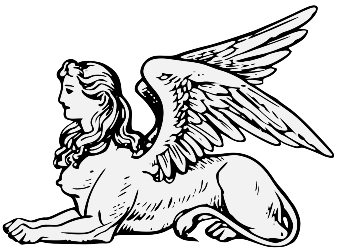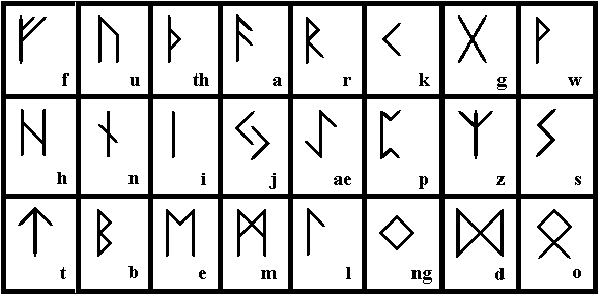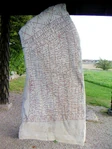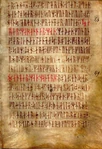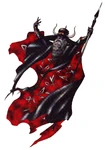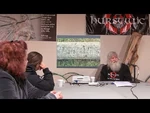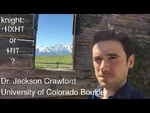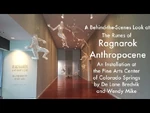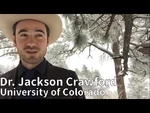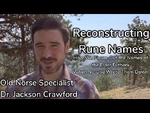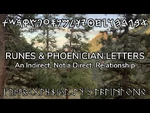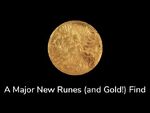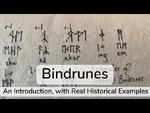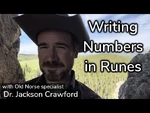In both Norse mythology and history, the runes (Old Norse rún, plural rúnar; from Proto-Germanic and Proto-Norse ᚱᚢᚾᛟ rūnō) were ancient letters used in the earliest alphabets of the Norse. The Runic language is also known as Futhark because of the first 6 letters.
History[]
The runes were in use among the Germanic peoples from the 1st or 2nd century AD. This period corresponds to the late Common Germanic stage linguistically, with a continuum of dialects not yet clearly separated into the three branches of later centuries: North Germanic, West Germanic, and East Germanic.
No distinction is made in surviving runic inscriptions between long and short vowels, although such a distinction was certainly present phonologically in the spoken languages of the time. Similarly, there are no signs for labiovelars in the Elder Futhark (such signs were introduced in both the Anglo-Saxon futhorc and the Gothic alphabet as variants of p)
The term runes is used to distinguish these symbols from Latin and Greek letters. It is attested on a 6th-century Alamannic runestaff as runa and possibly as runo on the 4th-century Einang stone. The name comes from the Germanic root run- (Gothic: 𐍂𐌿𐌽𐌰, runa), meaning "secret" or "whisper". In Old Irish Gaelic, the word rún means "mystery", "secret", "intention" or "affectionate love." Similarly in Welsh and Old English, the word rhin and rūn respectively means "mystery", "secret", "secret writing", or sometimes in the extreme sense of the word, "miracle" (gwyrth).
Runic alphabets[]
Elder Fuþark[]
| Rune | Transliteration | IPA | Proto-Germanic name | Meaning |
|---|---|---|---|---|
| f | /f/ | *fehu | "wealth, cattle" | |
| u | /u(ː)/ | ?*ūruz | "aurochs" (or *ûram "water/slag"?) | |
| þ | /θ/, /ð/ | ?*þurisaz | "thurse" (or *þunraz "the god Þunraz") | |
| a | /a(ː)/ | *ansuz | "ase (god)" | |
| r | /r/ | *raidō | "ride, journey" | |
| k | /k/ | ?*kaunan | "ulcer"? (or *kenaz "torch"?) | |
| g | /ɡ/ | *gebō | "gift" | |
| w | /w/ | *wunjō | "joy" | |
| h | /h/ | *hagalaz | "hail" (the precipitation) | |
| n | /n/ | *naudiz | "need" | |
| i | /i(ː)/ | *īsaz | "ice" | |
| j | /j/ | *jēra- | "year, good year, harvest" | |
| ï (or æ) | /æː/(?) | *ī(h)waz/*ei(h)waz | "yew-tree" | |
| p | /p/ | ?*perþ- | meaning unclear, perhaps "pear-tree". | |
| z | /z/ | ?*algiz | unclear, possibly "elk". | |
| s | /s/ | *sōwilō | "Sun" | |
| t | /t/ | *tīwaz/*teiwaz | "the god Tiwaz" | |
| b | /b/ | *berkanan | "birch" | |
| e | /e(ː)/ | *ehwaz | "horse" | |
| m | /m/ | *mannaz | "Man" | |
| l | /l/ | *laguz | "water, lake" (or possibly *laukaz "leek") | |
| ŋ | /ŋ/ | *ingwaz | "the god Ingwaz" | |
| o | /o(ː)/ | *ōþila-/*ōþala- | "heritage, estate, possession" | |
| d | /d/ | *dagaz | "day" |
Gallery[]
Scripts[]
In popular culture[]
Videos[]
External links[]
| Rúnar | |
|---|---|
| Elder Fuþark | ᚠ • ᚢ • ᚦ • ᚨ • ᚱ • ᚲ • ᚷ • ᚹ • ᚺ • ᚾ • ᛁ • ᛃ • ᛇ • ᛈ • ᛉ • ᛊ • ᛏ • ᛒ • ᛖ • ᛗ • ᛚ • ᛜ • ᛟ • ᛞ |
| Anglo-Saxon Fuþorc | ᚠ • ᚢ • ᚦ • ᚩ • ᚱ • ᚳ • ᚷ • ᚹ • ᚻ • ᚾ • ᛁ • ᛡ/ᛄ • ᛇ • ᛈ • ᛉ • ᛋ/ᚴ • ᛏ • ᛒ • ᛖ • ᛗ • ᛚ • ᛝ • ᛟ • ᛞ ᚪ • ᚫ • ᚣ • ᛡ • ᛠ • ᛣ • ᚸ • ᛢ • ᛥ |
| Younger Fuþark | ᚠ • ᚢ • ᚦ • ᚬ • ᚱ • ᚴ • ᚼ/ᚽ • ᚾ/ᚿ • ᛁ • ᛅ/ᛆ • ᛋ/ᛌ • ᛏ/ᛐ • ᛒ • ᛘ • ᛚ • ᛦ |
